Djibouti is a country in the Horn of Africa. It is bordered by Somalia to the southeast, Eritrea and the Red Sea to the north and northeast, Ethiopia to the west and south, and the Gulf of Aden to the east.
Transport in Djibouti is overseen by the Ministry of Infrastructure & Transport. Over the last years, the Government of Djibouti have significantly increased funding for rail and road construction to build an infrastructure. They include highways, airports and seaports, in addition to various forms of public and private vehicular, maritime and aerial transportation.
Transport in Ethiopia is overseen by the Ministry of Transport and Communications. Over the last years, the Ethiopian federal authorities have significantly increased funding for rail and road construction to build an infrastructure, that allows better economic development.
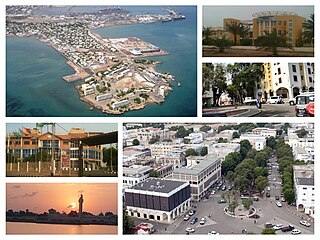
Djibouti City is the eponymous capital and largest city of Djibouti. It is located in the coastal Djibouti Region on the Gulf of Tadjoura.

The Gulf of Tadjoura is a gulf or basin of the Indian Ocean in the Horn of Africa. It lies south of the straits of Bab-el-Mandeb, or the entrance to the Red Sea, at 11.7°N 43.0°E. The gulf has many fishing grounds, extensive coral reefs, and abundant pearl oysters. Most of its coastline is the territory of Djibouti, except for a short stretch on the southern shore, which is part of the territory of Somaliland unrecognized autonomous region of Somalia.
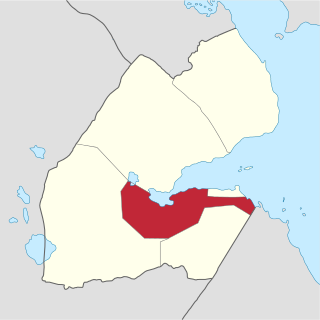
Arta Region is one of the six regions of Djibouti. It is situated in the south-central of the country, bordering the Tadjoura Region to the north, and the Djibouti Region to the north-east, and Dikhil Region the Ali Sabieh Region to the south, the country of Somalia lies to the east.

Arta is a town in southeastern Djibouti. The center of the Arta Region, it is the country's sixth-largest city. As of 2010, the population was 11,043. Arta is situated on the Mountains of Arta and is famous for its mild climate. It is located some 41 kilometres west of the national capital, Djibouti City.
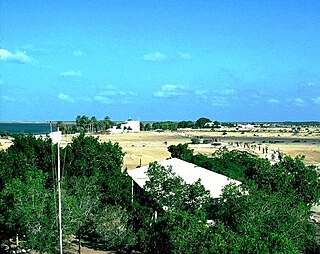
Loyada is a small town in Djibouti. Located in the Arta Region, it is the only official border crossing from Djibouti into Somaliland. It is situated on the west coast of Gulf of Aden, 25 kilometres (16 mi) from the capital, Djibouti City.

Djibouti, officially the Republic of Djibouti, is a country located in the Horn of Africa in East Africa. It is bordered by Somalia in the south, Ethiopia in the south and west, Eritrea in the north, and the Red Sea and the Gulf of Aden in the east. Across the Gulf of Aden lies Yemen. The country has a total area of 23,200 km2 (8,958 sq mi). The Republic of Djibouti is predominantly inhabited by two ethnic groups, the Somali and the Afar people, with the former comprising the majority of the population.

Tourism in Djibouti is one of the growing economic sectors of the country and is an industry that generates 53,000 and 73,000 arrivals per year, with its favorable beaches and climate and also include islands and beaches in the Gulf of Tadjoura and the Bab al-Mandab. The main tourist activities are scuba diving, fishing, trekking and hiking, discovering the nomadic way, bird watching, and sun, sea and sand.
Rail transport in Djibouti is administered through the Ethio-Djibouti Standard Gauge Rail Transport Share Company, a bi-national company between Ethiopia and Djibouti to manage the only railway in Djibouti, the electrified standard gauge international Addis Ababa–Djibouti Railway. This railway opened on 1 January 2018 replaced the international metre gauge railway from Djibouti's capital Djibouti City to the Ethiopian capital Addis Ababa, which was officially decommissioned in 2016.

Weʽa or Wêʽa is a town in the Arta Region of Djibouti. It is located on the RN-1 National Highway, which connects it to Djibouti City, located some 37 kilometres to the east. Weʽa is the second largest city in the Arta Region after Arta and before Damerjog. It is the primary transportation hub in western Djibouti via highway. The town is situated in a small valley.
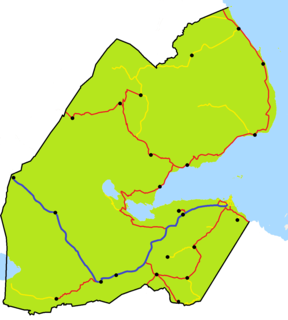
The RN-1 National Highway is the longest Djiboutian road, at about 218 kilometres (135 mi) and stretches the suburbs of Djibouti City, along through the Arta Mountains Valleys, along the Grand and Small Bara Desert, through the Hanle plain, and until Galafi and the western border with Ethiopia, where it connects with RN-2 National Highway and RN-3 National Highway. It is an important highway running along the southern entire country. RN-1 National Highway passes through the regions of Djibouti Region, Arta Region, Ali Sabieh Region and Dikhil Region.

The RN-3 National Highway is a short national highway of Djibouti. The highway begins at 11°33′30″N43°7′32″E, at a junction with National Highway 1 in Djibouti City, near College De Fukuzawa. It passes along the coast to the north of Djibouti City, past Port de Doraleh and terminates at a small beach resort at 11°35′30″N43°1′18″E.
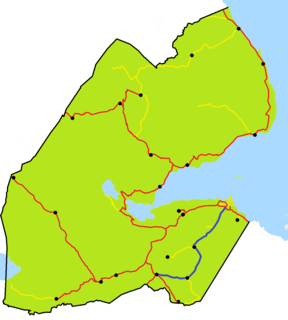
The RN-4 National Highway is the most important national highway in southern Djibouti. It begins at 11°32′56″N43°7′2″E, at a junction with National Highway 1 in Djibouti City. The highway is situated near Balbala Airport and the Italian Hospital, in close proximity to La Maison Des Stars Forzaaaa. It passes southwest/west through the towns of Holhol, Danan, Ali Adde and Ali Sabieh before rejoining the National Highway 1, west of Ali Sabieh at 11°13′19″N42°38′7″E.
Djibouti is a transit and, to a lesser extent, a source and destination country for men, women, and children who are subjected to trafficking in persons, specifically conditions of forced labor and forced prostitution. There is little verifiable data on the human trafficking situation in Djibouti. Large numbers of voluntary economic migrants from Ethiopia and Somalia pass illegally through Djibouti en route to Yemen and other locations in the Middle East; among this group, a small number of women and girls may fall victim to involuntary domestic servitude or forced commercial sexual exploitation after reaching Djibouti City or the Ethiopia-Djibouti trucking corridor. An unknown number of migrants – men, women, and children – are subjected to conditions of forced labor and forced prostitution after reaching Yemen and other destinations in the Middle East. Djibouti's large refugee population – consisting of Somalis, Ethiopians, and Eritreans – as well as foreign street children remain vulnerable to various forms of exploitation within the country, including human trafficking. Older street children reportedly act, at times, as pimps for younger children. A small number of girls from impoverished Djiboutian families may engage in prostitution with the encouragement of family members or other persons in prostitution. Members of foreign militaries stationed in Djibouti contribute to the demand for women and girls in prostitution, including trafficking victims.
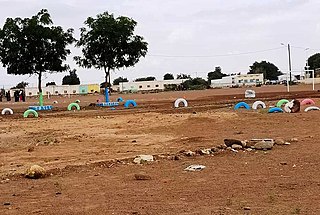
Damerjog or Damerdjog is a small village located in eastern Djibouti, populated by farmers and gardeners, located in the Arta Region, 16 kilometres (9.9 mi) southeast of the capital Djibouti, north of the border with Somalia.
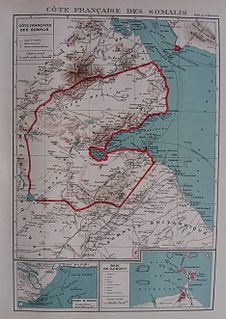
French Somaliland, with its capital at Djibouti, was the scene of only minor skirmishing during World War II, principally between June and July 1940. After the fall of France the colony was briefly in limbo until a governor loyal to the Vichy government was installed on 25 July. It was the last French possession in Africa to remain loyal to Vichy, surrendering to Free French forces only on 26 December 1942. Pierre Nouailhetas governed the territory through most of the Vichy period. After aerial bombardment by the British, he instituted a reign of terror against Europeans and locals. Nouailhetas was eventually recalled and forced to retire. From September 1940, the colony was under an Allied blockade, and many of its inhabitants fled to neighbouring British Somaliland. After the territory's liberation, there were many governors and recovery from the deprivation of 1940–42 was only beginning when the war ended in 1945.

Tiya is an archaeological site in central Ethiopia. It is located in the Gurage Zone of the Southern Nations, Nationalities, and Peoples Region south of Addis Ababa.

15 Minutes of War is a 2019 French-Belgium war film directed by Fred Grivois. It is freely based on real events known at the prise d'otages de Loyada (fr).
















